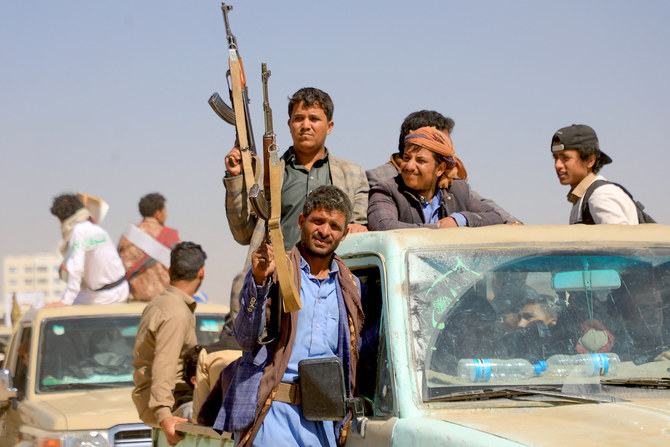
HRW: Abdulwahab Qatran arrested for criticism of group’s attacks on ships in Red Sea
‘They are ruthlessly silencing Yemenis under their rule who dare to criticize them’
LONDON: Human Rights Watch has called on the Houthis to release a Yemeni judge detained by the group for his criticism of it on social media.
Abdulwahab Qatran was arrested on Jan. 2 in Sanaa, having condemned Houthi attacks on international shipping in the Red Sea on X.
Qatran’s son Mohammed used the same platform to reveal that Houthi security forces entered the family’s home at 10 a.m. and forced them into military vehicles, detaining and interrogating them for several hours. Qatran was then formally placed under arrest and taken to a secure location.
Niku Jafarnia, Yemen and Bahrain researcher at HRW, said: “While the Houthis are busy promoting an image to the world that they are defending Palestinians in Gaza against Israel’s atrocities, they are ruthlessly silencing Yemenis under their rule who dare to criticize them.”
She added: “People across Houthi territories don’t have adequate food and water; solving that should be the Houthis’ priority, not chasing down every person who speaks out against them.”
Qatran’s family were not informed of the judge’s whereabouts until Jan. 5, when a family friend contacted the Security and Intelligence Department. Mohammed was the only relative permitted to visit him, and only on one occasion.
On Jan. 28, Qatran’s other son Ahmed was permitted a 20-second phone call in which the judge reportedly said: “I’m dead.”
Mohammed added on social media that his family had their phones and computers confiscated, and that the Houthis had told neighbors they were being arrested for illegally making and consuming alcohol.
“(The Houthis) showed us alcohol bottles that we’ve never seen — they claimed they found them in our house,” Mohammed said in a video on X. “Huge amounts of alcohol in so many different kinds that I’ve never seen before.”
HRW said it believes Qatran was arrested for his criticism of the Houthis and not for alcohol-related allegations.
It said one source was told by a Security and Intelligence Department official: “If you have a rooster that bothers you by his yelling all the time, what you will do with it?”
The group said the source, who had asked the department why Qatran had been arrested, added: “That was when we knew his arrest was because of his political and rights activism.”
HRW said Qatran is a well-known critic of the Houthis, posting on X on Dec. 31 in response to attacks on shipping in the Red Sea: “You (Houthis) are not entitled on behalf of Yemenis to fight anyone, do you understand?!”
Human rights activist Riyadh Al-Dubai told HRW that Qatran’s posts were “the straw that broke the camel’s back.”
He said: “Although Qatran is a judge, he refused to go to work because of his position against (the) Houthis’ policies and the way they run governmental institutions.”
Al-Dubai added: “The Houthis have nothing to do with the war in Gaza, they’re just utilizing the Palestinian cause to run from their internal obligations toward the Yemenis ... (including) providing salaries and services to people under their control.”
Mohammed filed official complaints to the Houthis’ Supreme Judicial Council on Jan. 15 and to the group’s human rights minister on Jan. 18, citing a violation of article 87 of Yemen’s Law of Judicial Authority forbidding the arrest of judges without a warrant or charges from the council. He has not received a reply from either.
HRW said Qatran’s case was just one example of “a broader pattern of Houthi crackdowns on people’s rights to freedom of expression, as well as a pattern of abuse against activists and perceived political opponents.
“Houthi forces have arbitrarily detained, disappeared, assaulted, and tortured activists, journalists, and students, and have often charged them with unsubstantiated violations unrelated to free expression, in violation of their rights to a fair trial, liberty, and security.
It cited the case of Fatima Al-Arwali, a 35-year-old activist who was detained by the group in Taiz in August 2022 and was recently sentenced to death. She has repeatedly been denied legal representation or family access.
HRW also reiterated the poor treatment of Bahais in parts of Yemen under its control, including forced exile and arbitrary detention.
In a 2023 report, a UN panel investigating the treatment of Bahais by the Houthis said forced disappearances and torture had also been committed by the group.
Yemeni civil group Mwatana for Human Rights said it had identified 1,482 cases of arbitrary detention and 596 cases of enforced disappearance by the Houthis from 2015 to April 2023, in clear violation of international humanitarian law.









